by Bethany Blankley
More than half of the households surveyed in the four largest U.S. cities are facing serious financial problems as a result of their state and city shutdowns, a new five-part polling series conducted by NPR, The Robert Wood Johnson Foundation, and Harvard T.H. Chan School of Public Health, found.
The series, conducted in July and August, examined the most serious health and financial problems facing households across America prior to the expiration of federal coronavirus support programs ending in September. It focused specifically on the impact of state shutdowns in the four largest U.S. cities: Chicago, Houston, Los Angeles and New York City. And it addressed the areas of families’ finances, employment, health care, housing, transportation, caregiving and overall well-being.
A sizable share of households said they have had “serious problems keeping children’s education going, finding childcare while working, finding space for children to get physical activity while maintaining a safe distance from others, and internet connectivity issues,” the report states.
Families also have not been able to get medical care for serious health problems because of state and city shutdowns. The majority has faced negative health consequences as a result.
“These findings raise important concerns about households’ abilities to weather long-term financial and health effects of the coronavirus outbreak, as a large share have depleted their savings and are having major problems paying for basic costs of living, including food, rent, and medical care,” the report states.
In Houston, the most populated city in Texas, which received more than $400 million in federal coronavirus relief aid, 63 percent surveyed said they are facing serious financial problems. The majority earns less than $100,000 a year, and is primarily Black and Hispanic.
Majorities of Black households also reported serious financial problems in Chicago (69 percent), New York City (62 percent) and Los Angeles (52 percent).
“Before federal coronavirus support programs even expired, we find millions of people with very serious problems with their finances,” Robert J. Blendon, a poll co-director and executive director at the Harvard Chan School, told NPR.
“This is what I would expect without a national emergency relief bill,” Blendon added. “We had a $2 trillion relief bill to lift people up and put a pillow under them. But it is not helping nearly as many people as we had expected.”
Forty-one percent of Houstonians surveyed said they have used most of their savings; 23 percent said they didn’t have any household savings prior to the coronavirus outbreak.
Roughly 41 percent said they “are having serious problems paying” their credit card bills, loans, or other debt; 37 percent, their utilities; 34 percent, their mortgage or rent; and 33 percent, affording food.
A majority of Houston households, 57 percent, said they have lost their jobs, been furloughed, or had wages or hours reduced since the start of the coronavirus shutdowns in March. About 47 percent said someone works from home at least some of the time, and among those working from home, 12 percent reported serious problems being able to do so.
Sixty-one percent said they could not afford health care and could not get an appointment during the hours they needed; 54 percent said they could not find a doctor who would see them; 35 percent said the health care location was too far or difficult to get to; 22 percent said they could not find a doctor who would take their health insurance.
Among households with children, 60 percent of parents reported having “serious problems caring for their children.” Roughly 40 percent “face serious problems” finding space for them to get physical activity while maintaining a safe distance from others; and 35 percent face serious problems keeping their children’s education going.
Approximately 45 percent of Houston households with children report either having serious problems with their Internet connection, or that they do not have a high-speed Internet connection at home.
– – –
Bethany Blankley is a reporter for The Center Square.
Photo “Money” by 401(k) 2012 CC2.0




